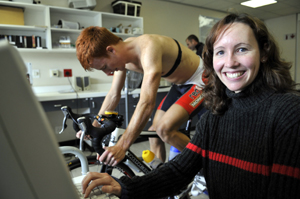Fatty findings
09 June 2008 |
Play what you may, carbo-loading has become the watchword of competitive sportspeople, sensible enough as carbohydrates are the body's main source of energy.
But the findings of doctoral graduate Lize Havemann of the Medical Research Council/UCT Research Unit for Exercise Science and Sports Medicine may give purists food for thought. In her study on different nutritional strategies for ultra-distance cyclists, Havemann mixed things up.
For six days, she plied her subjects with a fat-rich diet of seeds, cheeses, salami, creams and the like - meals some found hard to stomach - followed by a day of carbo-loading.
The idea, says Havemann, was to train the body to use more of its fat sources. Which it did, but, alas, with no significant overall improvement in performance over 100- and 200km "races" in the lab.
Results did show, however, that the new diet hampered cyclists' sprinting ability in shorter races - where sprints are more common - but revved up climbing performance over the 200km cycle.
One of Havemann's conclusions is that her experiment did not alter "metabolic phenotype". Meaning that those used to high-fat diets anyway (call them fat-burners) adapted better than their carbo-burning counterparts.
Havemann's not ready for any sweeping statements just yet - one of her articles sparked some debate - but says further study may well show that fat-loading prior to a race could give fat-burners a leg-up.
 This work is licensed under a Creative Commons Attribution-NoDerivatives 4.0 International License.
This work is licensed under a Creative Commons Attribution-NoDerivatives 4.0 International License.
Please view the republishing articles page for more information.







